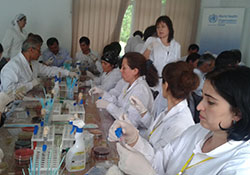Strengthening food safety in Tajikistan

WHO/Khadicha Boymatova
WHO/Europe, through its food safety programme and its Tajikistan Country Office, has been carrying out integrated activities to assist Tajikistan in strengthening food safety.
Through the following activities, national capacity has improved in the areas of prevention of foodborne disease, especially botulism, and of integrated surveillance of foodborne infections with a focus on antimicrobial resistance.
- Technical support and expertise were provided to a national Intersectoral Working Group for drafting a Nutrition and Food Safety Strategy for Tajikistan. Priorities for the 2012-2020 period were discussed with WHO across three missions, three workshops and several meetings in Dushanbe with representatives from all concerned government agencies, partners and donors working in the fields of nutrition, food safety and food security. The final version of the Nutrition and Food Safety Strategy for Tajikistan was submitted to the Ministry of Health for possible Government approval by the end of 2013.
- Prevention of foodborne diseases, particularly of botulism, was improved through several WHO workshops. Information materials on prevention of botulism were produced by WHO and distributed with support from the Ministry of Health and from Tajik mass media.
- The Tajikistan Codex Intersectoral Working Group actively participated in joint FAO/WHO workshops on Codex work to strengthen national capacities in Codex participation and to establish mechanisms for subregional cooperation in Codex activities. Tajikistan’s effective participation in the work of the Codex Alimentarius Commission is furthermore supported by WHO/Europe’s ongoing assistance
- In May 2013, Tajik food safety microbiologists and epidemiologist were trained on integrated foodborne infections surveillance with focus on antimicrobial resistance. The course aimed to strengthen primary health care capacities in Tajikistan in the area of foodborne diseases and antimicrobial resistance surveillance.



